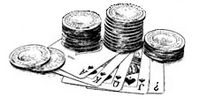Mercury Rising
A parody by Wyld Card, sung to the tune of "Mercury Blues"
I got the money, tell you what I’ll do
Gonna buy a mercury credit or two
Cause my factory spits out mercury
Ooze it on down the road, up and down the road
I’m gonna buy off my mercury
And ooze it on down the roadI got some credits, bought ‘em from a friend
When he gets caught I’ll sell them back again
Because we’re crazy ‘bout the mercury
Ooze it on down the road, up and down the road
We’re gonna buy off our mercury
And ooze it on down the roadHey now, mama, you don’t look so hot
You lost some brain cells and your nerves are shot
You want to blame me but you know you can’t
It’s your own damn fault for living near my plant
Cause I’m crazy ‘bout the mercury,
Ooze it on down this road, up and down this road
I’m gonna buy off my mecury
And ooze it on down this road
Amid rising concern about mercury, EPA sets new rules
Two weeks ago, the EPA issued regulations that would allow power plants to buy and sell mercury pollution credits.
Mercury is a highly toxic substance that can poison wildlife and cause brain and nervous system damage in children and fetuses. Mercury is the only metal that is a liquid at room temperature, and therefore evaporates easily to spread through the atmosphere. But unlike other airborne pollutants which spread out, mercury tends to concentrate into "hot spots", and contaminates fish, birds, and other wildlife.
According to the Natural Resources Defense Council, a research and advocacy group, mercury pollution in the US has contaminated 12 million acres of lakes, estuaries, and wetlands (30 percent of the total), and 473,000 miles of streams, rivers, and coasts.Forty states have issued fish advisories in recent years, and 14 states - mostly in the Northeast and Midwest - have statewide advisories for some or all sport fish from rivers or lakes. Americans get most of their exposure to mercury from eating tuna fish.
The Government Accountability Office recently took the EPA to task for underplaying the danger. Meanwhile, the EPA's inspector general says agency scientists have been pressured to align themselves with the industry approach in addressing mercury.
So once again we find the current administration’s environmental philosophy in action - let the marketplace determine how we protect our environment and citizens. The polluters can buy mercury credits from cleaner plants, and don’t have to stop emitting mercury into the environment.
This may improve the overall average emission numbers, but it doesn’t reduce those 12 million acres of contaminated water or 473,000 miles of coast, streams and rivers. And it doesn’t help the people who are currently at risk of brain and nerve damage.
Environmentalists say that allowing individual power plants to acquire pollution credits would have the effect of creating "hot spots" and exposing local residents to unsafe levels of mercury."The cap-and-trade approach sounds great unless you are one of those people who live near a power plant that chooses to spend money on paper credits instead of making real mercury reductions," says Sierra Club executive director Carl Pope. "We know that for every six women of childbearing age in the US, one of them has mercury levels in her blood high enough to put her baby at risk."
So far, nine states have filed suit against the EPA in order to overturn the regulations. If you live anywhere near the spots on the map below, you should hope they succeed.







0 Comments:
Post a Comment
<< Home